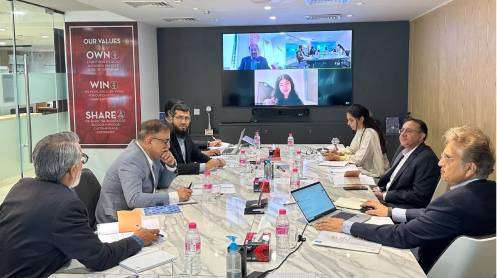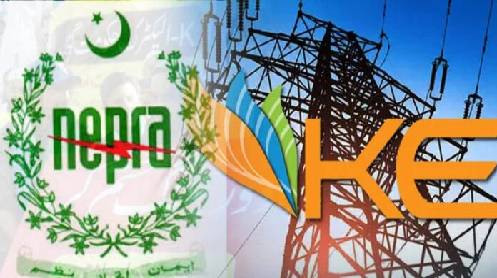- ECC directs Power Division to revise them after due consultation with all stakeholders
ISLAMABAD: National Electric Power Regulatory Authority (Nepra) has proposed revision in draft agreements between the Government of Pakistan (GoP) and K-Electric to align with the provisions of amended Nepra Act 2018, National Electric Policy 2021 (NE Policy), National Electricity Plan 2023 (NE Plan), new Market Commercial Code 2022(MCC) of CPPA as Market Operator, new Grid Code 2023 of NTDC as System Operator, draft Special Purpose Agent(SPA) Code of CPPA as Agent of Discos and other applicable documents, for successful and sustainable implementation.
The Economic Coordination Committee (ECC) of the Cabinet did not approve proposed draft PPAA, ICA and TDS agreements and directed Power Division to revise them after due consultation with all stakeholders as Power Division faced strong opposition from the concerned stakeholders.
With regards to Power Procurement Agency Agreement (PPAA), a number of provisions refer to or replicate the Commercial Code 2015. The CPPA-G has submitted an application for ‘Registration’ as Special Purpose Agent (SPA) of Discos along with a revised ‘SPA Code’, which is in the regulatory approval process with NEPRA, and shall supersede the Commercial Code approved in 2015.
Power sector: Nepra backs transition from Libor to ‘SOFR’
In addition, NEPRA has already approved the Market Commercial Code in May 2022 for carrying out market operations given that the PPAA should be aligned with the MCC and the draft SPA Code and other applicable documents.
The PPAA and Inter-Connection Agreement (ICA) envisage a firm electric power supply of 1,000 MW to K-Electric from the National Grid, whereas additional supply shall be made available on a pro-rata basis. Whilst the term of the PPAA and the ICA is 10 agreement years, it is not clear whether the firm capacity indicated in the agreements will be relevant once central economic dispatch system operations commence under a single system operator with Unified Economic Merit Order (U-EMO) and system marginal prices are implemented, as envisaged in the Section 23G of NEPRA Act, Clause 5.8.6 of National Electricity (NE) Policy, Strategic Directive 38 of NE Plan, new Grid Code 2023, Clause 19,1.2 of MCC and other enabling provisions of applicable documents.
According to NEPRA, the centralized system operations would warrant the supply of maximum amount of electricity to K-Electric from the National Grid. This will not only result in overall efficient generation operations, translating into reduction in overall basket price and government subsidies but would also contribute to solving power dispersal issues (south to north) and expected improving the overall system reliability and stability. In this regard, NEPRA has informed that K-Electric is in the process of constructing 500/220 kV KKI and 220/132 kV Dhabeji Grid Stations, with the completion in December 2024, which will allow transfer of electric power to approx. 2,800 MW from the National Grid to K-Electric.
The detailed design of the CTBCM, as approved by NEPRA, ratified by CCoE and then endorsed by the CII through NEP, requires the approval of the ICA from NEPRA.
The Regulator has highlighted that ICA draft is based on repealed Grid Code 2005, which requires substantive revision in light of new Grid Code 2023. The in-principle approval of the ECC may be sought, however, the effectiveness thereof should be made subject to NEPRA’s approval which will be provided after following the due regulatory process.
Offering comments on proposed Tariff Differential Subsidy (TDS) Agreement, NEPRA has stated that there is a specific provision pertaining to payment of mark-up to K-Electric(in case where NEPRA does not determine and issue the Quarterly Tariff Adjustment (QTAs) within fifteen days of tariff determination and within four months for tariff determination as stipulated in NEPRA Act)which starts from the admission of the petition (and not from filing), so the TDS agreement may be brought in line with the provisions of the NEPRA Act. Regarding QTAs, NEPRA noted that the Regulator, while deciding the said applications is obligated to adhere to the due process of law as specified in NEPRA Tariff (Standards and Procedures) Rules, 1998. This process includes conducting public hearings, publishing notices, individually notifying stakeholders and thoroughly examining the data submitted by the petitioner. Consequently, a time period of 15 days is, indeed, unreasonable. It is also pertinent to mention that in the decision of the Supreme Court of Pakistan (titled civil appeals No. 807-810, 812-818, 820-821, 832-834, 836-852, 854,856-860, 863-864, 870-882, 870-882, 882-890 and 896 of 2013, 1-4,8.10-11, 13-18, 828-842 and 859 of 2014) of May 2, 2018, allowed the processing time of 04 and 02 months for deciding positive and negative Fuel Charges Adjustments (FCAs) respectively, while recognizing processing of requests. Likewise, the QTAs should be dealt with on the same timelines. NEPRA will however endeavor to decide it expeditiously.
Attorney General Office, in its comments has said that it has no objection to draft summary and mediation agreement. For avoidance of doubt, Attorney General Office has offered no comments on technical and financial matters specified in the PPAA, ICA and TDS agreements.
According to the summary of Power Division which was not approved KE was privatised in 2005 as an integrated utility. After the privatisation, GoP continued to supply 650 MW power to KE under a PPA which was expired in 2015. However, the supplies continued to be made under a Court order from SHC. Due to expiry of the PPA, payables/receivables position between KE and GoP started to deteriorate because of the fact that KE stopped paying on the plea that these payments are to be settled against TDS receivable from GoP but not being paid to KE.
Meanwhile, Cabinet Committee on Energy (CCoE) on August 27, 2020, approved the additional supply of 350 MW of power to KE from National Grid in addition to the supply of 650 MW to meet the increasing demand and avoid hardships for consumers of KE region. Further, the CCoE vide decision dated June 19, 2020, also directed to finalize the Power Purchase Agreement for the supply of power to KE from the National Grid, which had expired in 2015 including the supply of additional power to KE from the National Grid. In order to proceed ahead, CPPA-G/ NTDC/ SSGC and K-Electric negotiated various agreements. However, the parties could not proceed ahead on agreements due to disagreement on volume of firm capacity as base load supply from national grid, non-reconciliation of receivable and payables and interest charges, way forward on settlement of legal & regulatory issues and allied matters.
Power Division argues that K-Electric and Its shareholders have also been agitating non-resolution of these issues at various forums.
In order to resolve issues/ disputes related to K-Electric and to improve its cash flows and to streamline the generation of electricity from its power plants, a Task Force was constituted by Prime Minister, with Shahid Khaqan Abbasi, ex-MNA as its Chairman and Federal Ministers for Power, Finance, Maritime Affairs, Minister of State for Petroleum and Federal Secretaries of Power, Finance, Petroleum, Chief Secretary Sindh and Additional Secretary (CF) Finance Division as its members. The Task Force held a series of meetings and several follow-up sessions with all relevant stakeholders from August 2022 to July 2023 to find amicable solutions to the disputes under discussion among the parties. The Task Force report was submitted to the Prime Minister on July 21, 2023. The Prime Minister of Pakistan considered the report and directed Power Division to review the report and take further actions on the recommendations, in accordance with relevant laws/policy, and take the matter to CCoE and ECC after addressing various aspects as highlighted in a Prime Minister’s Office note of August 2023 addressed to Secretary Power Division.
Considering Prime Minister directives with regards to K Electric’s commitment about its obligation to add more generation, Power Division constituted a committee on Oct 2, 2023. The Committee held multiple meetings and framed a due diligence report on KE’s integrated generation plan along with recommendations. The Plan envisages addition of cumulative baseload capacity of 3000 MW as future capacity addition to be undertaken in next 10 years in IPP mode. Planned projects are based on private funded IPPs either in green field or Brownfield conversions.
An important intervention is with regard to GoP owned Jamshoro Coal Power Plant with Unit-1 of the plant almost ready for operations on imported coal and the plan is to convert it on local coal and divert its generation to KE. The decision has some financial implications in terms of Interest During Construction (IDC) but the long-term benefits of conversion has savings in terms of foreign exchange. Similarly, Unit-1 of the project could not be established due to lack of funding. Unit-II is also part of plan to be built either by KE as lead financier or through PPIB as an IPP. To fulfill its obligations, as power off taker, KE has also committed to invest in interconnection facilities under 7-Year investment plan submitted to NEPRA. During the Task Force meetings, the issues of historic receivables and payables between KE and Government entities and departments were highlighted, which have been impacting the overall sector liquidity and sustainability. The Task Force decided that the reconciliation of outstanding amounts be carried out between the parties as of June 30, 2022, based on audited financial statements of respective entities which have been duly reconciled and resultant reconciliation statements have been initialed by the parties.
Draft Power Purchase Agency Agreement (PPAA) along with Master Collection Account (MCA) between CPPAG and KE, draft Interconnection Agreement (ICA) between NTDC and KE, and draft Tariff differential subsidy agreement between Government of Pakistan and KE were negotiated and initialed by the parties. Further, on the recommendation of the Attorney General’s Office, a draft Mediation Agreement for the settlement of historic dues was also negotiated and initialed by all parties.
Power Division supported the recommendations of the Task Force and the Committee constituted for due diligence on Indicative Generation Plan, PPAA, ICA, TDS, and Mediation Agreements have been agreed upon and initialed by the parties, after detailed negotiations, based on principles set out by the task force. Approval of these agreements will resolve long pending issues between KE and GoP entities and regular payment will be streamlined by all the parties to avoid any addition in circular debt.
However, insiders in Power Division are of the view that being a success story of privatisation, resolution of KE’s long-standing issues will be a breakthrough to usher in further investment in the country
Earlier this month Caretaker Prime Minister met with representatives of Al Jomaih which is KE’s largest and oldest shareholders.
Expedient resolution of these legacy matters is also a positive signal for future privatisation of Discos which remains the only solution for the sustainable resolution of power sector issues.
KE’s good performance stood out in recent inquiry into the billing practices of Discos, indicating the effectiveness of privatization as a viable way forward.







